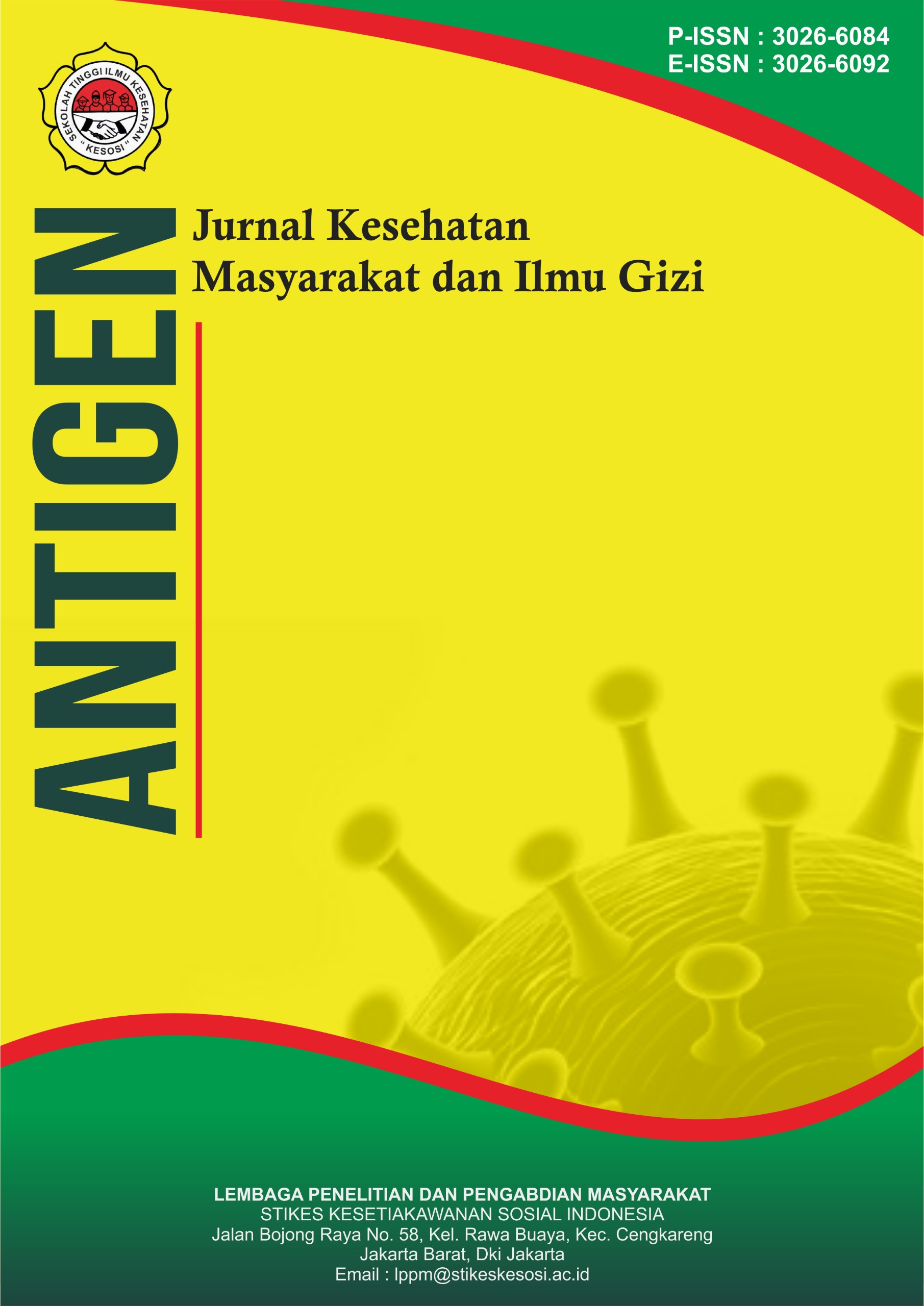Studi Literatur Review: Efek Pemberian Genistein untuk Mengatasi Beberapa Penyakit Kardiovaskular
DOI:
https://doi.org/10.57213/antigen.v3i3.736Keywords:
Blood Pressure, Cardiovascular, Genistein, Lipid Profile, HypertrophyAbstract
Cardiovascular is a heart or blood vessel disorder that is the leading cause of death in the world. Genistein is one of the phytochemicals contained in soybeans that has estrogenic properties and can help in dealing with cardiovascular diseases, such as hypertension, lipid profile disorder (dislipidemia), hypertrophy and so on. According to the FDA, the limit of soy consumption to get the beneficial effects of genistein is 25 grams. Excessive consumption can cause side effects such as hypothyroidism, testosterone imbalance, allergic hypersensitivity in children, and cancer cell proliferation. This review literature study explores the mechanisms of genistein against several cardiovascular diseases. In the search for English articles, the keywords used to get articles that match the criteria are “genistein”, “cardiovascular”, “hypertrophy”, “Hypertension”, “blood pressure”, and “lipid profile” and have been published for 10 years. The database used in the article search is PubMed and Science Direct. Based on the exclusion and inclusion of the article selection, there are 6 articles worthy of further examination. A sixth study in the journal found that genistein can improve lipid profiles, lower blood pressure, and decrease pulmonary hypertrophy. Genistein has estrogenic, anti-inflammatory, antioxidant, and immunomodulatory properties that can help reduce cardiovascular disease. There are several factors that influence the effectiveness of genistein, namely diet, physical activity, interaction with other nutrients, duration of consumption, and dosage of genystein intake.
References
Amanat, S., et al. (2018). Genistein supplementation improves insulin resistance and inflammatory state in non-alcoholic fatty liver patients: A randomized, controlled trial. Clinical Nutrition, 37(4), 1210–1215. https://doi.org/10.1016/j.clnu.2017.05.028
Braxas, H., et al. (2019). Effectiveness of genistein supplementation on metabolic factors and antioxidant status in postmenopausal women with type 2 diabetes mellitus. Canadian Journal of Diabetes, 43(7), 490–497. https://doi.org/10.1016/j.jcjd.2019.04.007
Charitos, I. A., Aliani, M., Tondo, P., Venneri, M., Castellana, G., Scioscia, G., Castellaneta, F., Lacedonia, D., & Carone, M. (2024). Biomolecular actions by intestinal endotoxemia in metabolic syndrome. International Journal of Molecular Sciences, 25(5), 2841. https://doi.org/10.3390/ijms25052841
De Gregorio, C., et al. (2017). Genistein supplementation and cardiac function in postmenopausal women with metabolic syndrome: Results from a pilot strain-echo study. Nutrients, 9(6), 584. https://doi.org/10.3390/nu9060584
Ganai, A. A., & Farooqi, H. (2015). Bioactivity of genistein: A review of in vitro and in vivo studies. Biomedicine & Pharmacotherapy, 76, 30–38. https://doi.org/10.1016/j.biopha.2015.10.026
Gómez-Zorita, S., González-Arceo, M., Fernández-Quintela, A., Eseberri, I., Trepiana, J., & Portillo, M. P. (2020). Scientific evidence supporting the beneficial effects of isoflavones on human health. Nutrients, 12(12), 3853. https://doi.org/10.3390/nu12123853
Guevara-Cruz, M., et al. (2020). Genistein stimulates insulin sensitivity through gut microbiota reshaping and skeletal muscle AMPK activation in obese subjects. BMJ Open Diabetes Research & Care, 8(1), e000948. https://doi.org/10.1136/bmjdrc-2019-000948
Haldy, J., & Kurniawidjaja, L. M. (2024). Faktor risiko penyakit kardiovaskular pada pekerja: A systematic review. Prepotif: Jurnal Kesehatan Masyarakat, 8(1), 47–59. https://doi.org/10.31004/prepotif.v8i1.23619
Hassan, M. H., et al. (2025). Isoflavones: Promising natural agent for cancer prevention and treatment. Food Science & Nutrition, 13(3), e70091. https://doi.org/10.1002/fsn3.70091
Holm, E., et al. (2025). AMPK activator ATX-304 reduces oxidative stress and improves MASLD via metabolic switching. JCI Insight, 10(7), e179990. https://doi.org/10.1172/jci.insight.179990
Jafari, S., Shoghi, M., & Khazdair, M. R. (2023). Pharmacological effects of genistein on cardiovascular diseases. Evidence-Based Complementary and Alternative Medicine, 2023, 8250219. https://doi.org/10.1155/2023/8250219
Jumayanti, J., Wicaksana, A. L., & Sunaryo, E. Y. A. B. (2020). Kualitas hidup pasien dengan penyakit kardiovaskular di Yogyakarta. Jurnal Kesehatan, 13(1), 1–12.
Kosmas, C. E., et al. (2023). Insulin resistance and cardiovascular disease. The Journal of International Medical Research, 51(3), 03000605231164548. https://doi.org/10.1177/03000605231164548
Lopez, E. O., Ballard, B. D., & Jan, A. (2023). Cardiovascular disease. StatPearls. https://www.ncbi.nlm.nih.gov/books/NBK535419/
Saifullah, Y. Y. K., Rachman, M. E., Limoa, L. T., & Hamado, N. (2024). Literature review: Hubungan hipertensi dengan kejadian stroke iskemik dan stroke hemoragik. Fakumi Medical Journal.
Sharifi-Rad, J., Quispe, C., et al. (2021). Genistein: An integrative overview of its mode of action, pharmacological properties, and health benefits. Oxidative Medicine and Cellular Longevity, 2021, 3268136. https://doi.org/10.1155/2021/3268136
Teo, K. K., & Rafiq, T. (2021). Cardiovascular risk factors and prevention: A perspective from developing countries. Canadian Journal of Cardiology, 37(5), 733–743. https://doi.org/10.1016/j.cjca.2021.02.009
Usategui-Martín, R., et al. (2019). Estrogen receptor genes polymorphisms determine serum lipid profile in healthy postmenopausal women treated with calcium, vitamin D, and genistein. Journal of Cellular Biochemistry, 120(8), 13115–13120.
Wirawati, I. A. (2018). Pemeriksaan profil lipid. Pemeriksaan Profil Lipid, 26.
Ye, Y. B., et al. (2021). Effects of daidzein and genistein on markers of cardiovascular disease risk among women with impaired glucose regulation: A double-blind, randomized, placebo-controlled trial. Food & Function, 12(17), 7997–8006. https://doi.org/10.1039/d1fo00712b
Zaheer, K., & Akhtar, H. M. (2017). An updated review of dietary isoflavones: Nutrition, processing, bioavailability and impacts on human health. Critical Reviews in Food Science and Nutrition, 57(6), 1280–1293.
Zhang, L., et al. (2025). The impact of dietary fiber on cardiovascular diseases: A scoping review. Nutrients, 17(3), 444. https://doi.org/10.3390/nu17030444
Zhang, T., & Chi, X. X. (2019). The effect of genistein on lipid levels and LDLR, LXRα and ABCG1 expression in postmenopausal women with hyperlipidemia. Diabetology & Metabolic Syndrome, 11, 1–8.
Zheng, Z., et al. (2017). Genistein attenuates monocrotaline-induced pulmonary arterial hypertension in rats by activating PI3K/Akt/eNOS signaling. Histology and Histopathology, 32(1), 35–41. https://doi.org/10.14670/HH-11-768
Downloads
Published
Issue
Section
License
Copyright (c) 2025 Antigen : Jurnal Kesehatan Masyarakat dan Ilmu Gizi

This work is licensed under a Creative Commons Attribution-ShareAlike 4.0 International License.






